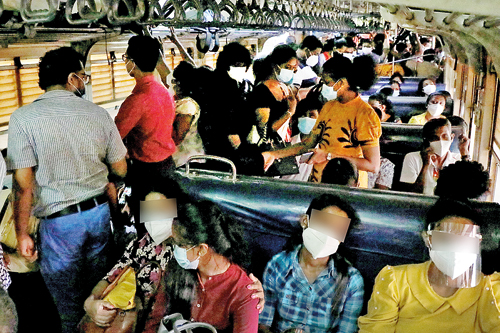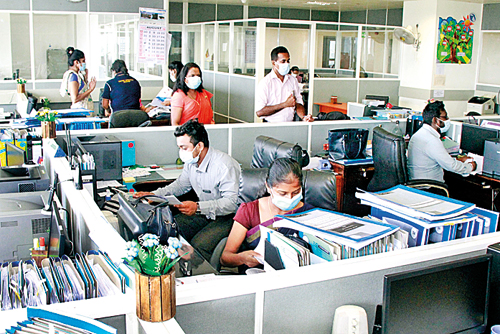News
As COVID pandemic rages, public service remains partially paralysed

Public sevants have no option but to travel to work in overcrowded public transport. Pic by M.A. Pushpa Kumara
The raging COVID-19 pandemic is severely undermining public institutions’ efforts to provide uninterrupted services even with a limited number of staff in keeping with a new circular.
They face a number of obstacles, including an increasing number of COVID-19 cases among public servants, travel difficulties due to restrictions on public transport services and a high rate of absenteeism in some offices.
For the past week, government offices have been functioning according to the August 6-dated revised circular issued by the Ministry of Public Services, Provincial Councils & Local Government. Titled “Maintaining the Public Service under Normalcy,” the circular called on public institution heads to prepare rosters in such a way that one officer should report for duty at least three days a week.
The circular also stated that public institutions heads should not call on pregnant staff and mothers with children below the age of one year to report to duty.
The hurriedly issued circular amended a July 30-dated circular, which required all government officers to report to work from Monday, August 2. That circular was issued by Public Administration Ministry Secretary J.J. Rathnasiri on the instructions of Presidential Secretary P.B. Jayasundara. At the time, the President’s Media Division stated that the decision was taken on the basis that since a large percentage of the population had been vaccinated against the COVID-19 in all districts, priority should be given to restore normal public service.
The Government quickly had to back paddle on the decision, though, with the “Delta” variant of COVID-19 causing havoc in many parts of the country and sending case numbers and the death toll up significantly. This resulted in the new circular being issued within the same week while all public officers had started reporting to work.
Mr Rathnasiri told the Sunday Times that work was proceeding according to the revised circular and that he had not been made aware of any major problems when implementing it.
Many public institutions were operating on a roster basis and calling in employees only three days a week, the Sunday Times found. While work in some institutions was proceeding smoothly, others were finding it a struggle due to several issues.
On Wednesday, the Department of Motor Traffic announced that services at its Narahenpita and Werahera offices would be suspended from Monday, August 16 as a “considerable number of officers” had been afflicted with COVID-19. Accordingly, all appointments reserved through the department’s 0112677877 hotline had been cancelled, the department said, adding that functions at the department’s district offices would be carried out under the guidance of the district secretaries.
The Department of Registration of Persons announced on Friday that it had halted services to the public after several employees tested positive for COVID-19.
“Some of our staff members have been afflicted with the virus while others have been isolated after becoming first contacts. Some have been quarantined at home after coming into contact with COVID patients outside the office. But we are doing the best we can under the circumstances,” the Department’s Commissioner General Viyani Gunathilaka told the Sunday Times.
He added that although the head office and provincial offices would be closed to the public, National Identity Cards (NICs) of those who had been given a time to collect at the office would be posted to their residences.
Those who are in need of the NICs for examinations, interviews, applying for passports or any other emergency can do so by contacting the head office on 0115226126/0115226100 during office hours or by sending an email to info@drp.lk, he said.
The issuance of passports under normal service at the Battaramulla head office of the Department of Immigration and Emigration has been suspended since August 6. At present, passports are only issued through the one-day service for urgent needs clients only, Department Spokesperson Gayan Milinda said.
He said about 11 staff members had tested positive for COVID-19 over the past several weeks, resulting in the decision to suspend normal services. The validity period of all types of visas of foreigners currently in the country has also been extended till September 7 to further ensure the numbers visiting the office are kept to a minimum. Staff members are called into work only on three days of the week on a roster basis, he added.
The Department of Government Printing, meanwhile, had been operating under a different work plan from the early days of the pandemic. “Since we are essentially a factory and have many different branches, we can’t operate according to shifts like most other government institutions. Therefore, we were operating with one group of staff for 14 days followed by another group for the next 14 days,” Government Printer Gangani Liyanage explained.
If a member of a particular branch is identified as a COVID patient, the branch is closed down and the rest of the staff directed to self-isolate for 14 days. The branch is then disinfected over several days and opened after three or four days with the next batch of staff at the branch being called into take over. The system has served the department well so far, Ms Liyanage said.
Problems arose after the issuance of the circular calling all officers to report to work from August 2. A number of staff members in different branches tested positive during last week, resulting in several branches having to be shut down at once. With all staff having reported to work, this meant that a far larger group is now in isolation after being first contacts. “We have disinfected the branches and are gradually starting to open them up now. We have again returned to the 14-day roster,” Ms Liyanage said.
At various institutions, some junior public officers, who spoke on grounds of anonymity, said they were doing their best despite challenges. An Education Ministry official said that in his division at the Battaramulla office, the staff reported to work only three days a week as per the circular. While the initial plan had been to have officers reporting to work on a roster basis three days a week from Monday to Saturday, the idea of calling officers to work on Saturdays was shelved as it was impractical in the current situation where public transport was also limited, said the officer, who commutes daily from Galle.
“Our division is mainly involved in field work, but we have stopped most such work due to the risks involved and are only attending to work at office.”

Running operations at the Colombo Secretariat with a skeleton staff. Pic by Indika Handuwala
Officers who have been given office transport must report all five days to work, he said.
One of the main problems, particularly for those commuting to office between provinces, is the limited public transport options, the officer noted. “Only a few buses are operating and that too at half the seating capacity. The number of trains operating is also less. However, department heads are aware of the matter and as such, those coming to work late on account of transport issues are not being penalised, at least for now.”
Another officer who works at a government ministry and who also commutes to work from Galle, said she was having issues on account of a significant number of staff members in her division taking leave. “Leave for most government employees have not been utilised for much of this year owing to the fact that the work from home arrangement was in effect. Given that leave is available, some have taken to coming into work on one of the days allocated to them and then taking leave for the other two days. This has created a backlog of work and also adds to the strain on those who are working. However, given that the underlying motive is fear over the pandemic, one can’t really blame them either,” she said.
An officer based at the Matugama Courts complex said COVID infections among lawyers and court staff has hampered activities at both the magistrate’s and district courts. The number of cases being heard in courts is also limited due to measures aimed at limiting the number of people in court. “It’s hard work, but we are still functioning somehow despite the difficulties,” the officer added.
A staff member of the Sabaragamuwa Provincial Council said that there were about 35 members in her branch and this had been divided into two teams because of the need to maintain social distance in the limited office space. “If one officer is called in on three days, the one next to them is not, so as to maintain social distancing between officers. However, we too have an issue with absenteeism. People come in one day and try to finish even the workload they have over the next two days. Then they go on leave for the next two days of their shift.”
Given the current situation, people visiting public institutions can expect delays in getting work done, an officer from a government office in Kalutara said. “We don’t have enough staff and with some being infected with COVID and others being quarantined, it really is difficult for those of us reporting to work,” he remarked.

